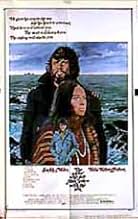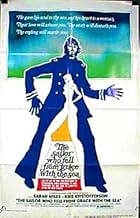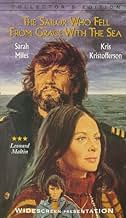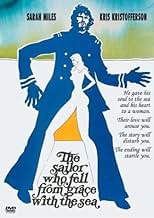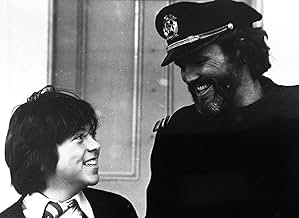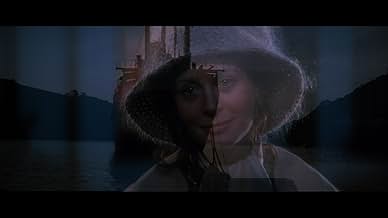IMDb RATING
6.2/10
1.8K
YOUR RATING
After his father dies, a disturbed young boy plots to take revenge on the new man in his mother's life.After his father dies, a disturbed young boy plots to take revenge on the new man in his mother's life.After his father dies, a disturbed young boy plots to take revenge on the new man in his mother's life.
- Director
- Writers
- Stars
- Awards
- 2 nominations total
Charles Adey-Grey
- Man in Tea Room
- (uncredited)
Mabel Etherington
- Woman in Tea Room
- (uncredited)
Juba Kennerley
- Man in Tea Room
- (uncredited)
- Director
- Writers
- All cast & crew
- Production, box office & more at IMDbPro
Featured reviews
This movie is morbid but is quite faithful to the original story. And it uses its Dover location very effectively in showing a place isolated in its own mythology.
The story is about a fatherless adolescent boy who is himself very much like the sea. He is restless and calm and seemingly untameable. All the confusion and frustrations of adolescence are portrayed here in an honesty that no other movie has ever dared to show. The restless urge to be a grown up and to move on to a life of daring excitement, and the desire to find a philosophy and a poetry to which one can ascribe are all explored in an uncompromising way in this film.
Desperate for an authority and leadership that he can look up to, the boy finds himself vying for the acceptance of a sadistic boy with a Nietzsche complex who uses a strain of hierarchy in his little band of friends in order to maintain control. Soon Kristofferson shows up and as he seems to be the stuff of oceanic legends, the boy finds a new hero to worship.
I would not even attempt to give the ending away. Suffice it to say that this is a most disturbing film in its subject matter and for those with short attention spans, it may seem slow in its pace. But like the sea, the film is languid in its pacing and it promises the same degree of poetry and savagery.
Fascinating viewing!
The story is about a fatherless adolescent boy who is himself very much like the sea. He is restless and calm and seemingly untameable. All the confusion and frustrations of adolescence are portrayed here in an honesty that no other movie has ever dared to show. The restless urge to be a grown up and to move on to a life of daring excitement, and the desire to find a philosophy and a poetry to which one can ascribe are all explored in an uncompromising way in this film.
Desperate for an authority and leadership that he can look up to, the boy finds himself vying for the acceptance of a sadistic boy with a Nietzsche complex who uses a strain of hierarchy in his little band of friends in order to maintain control. Soon Kristofferson shows up and as he seems to be the stuff of oceanic legends, the boy finds a new hero to worship.
I would not even attempt to give the ending away. Suffice it to say that this is a most disturbing film in its subject matter and for those with short attention spans, it may seem slow in its pace. But like the sea, the film is languid in its pacing and it promises the same degree of poetry and savagery.
Fascinating viewing!
The script and direction meld into a strong movie. With charm and humor to spare, this film was among the top echelon of movies from 1976. The characters in this film have a lot of depth, and that makes all the difference. In the end, the audience gets a casserole of film elements and little of the satisfaction that comes from watching these types of movies. I guess if I was in a bad mood, this movie wouldn't be half as good, but I thought it to be enjoyable and would recommend it. This is a story about a place most people might not be able to conceive. It is a powerful film. Many scenes do not feel believable, but good performances help to enhance this story.
The movie is indeed an adaptation of a novel by Yukio Mishima. Just to clarify, the novel is not an obscure work. Mishima is amongst Japan's most famous writers and was nominated for the Nobel Prize for Literature three times. Also, the plot of the original Japanese story does not happen in a remote fishing village; it happens in Yokohama, which is one of Japan's largest cities. Lastly, it does not happen in feudal Japan, a fact that would be very evident had someone read the book.
Now that that's been said, I've watched the movie since I very much enjoyed the novel. While I agree with most comments concerning the movie itself, I actually very much enjoyed the ending. Not only would have supplying an ending would have been taking too much liberty, but also it allows the viewer to imagine what would happen. Furthermore, to challenge another commenter, this sort of ending does work in movies and was a common motif of films during this era. Some other notable movies with endings similar to this include Francis Ford Coppola's "The Conversation" and "Parallax View."
Now that that's been said, I've watched the movie since I very much enjoyed the novel. While I agree with most comments concerning the movie itself, I actually very much enjoyed the ending. Not only would have supplying an ending would have been taking too much liberty, but also it allows the viewer to imagine what would happen. Furthermore, to challenge another commenter, this sort of ending does work in movies and was a common motif of films during this era. Some other notable movies with endings similar to this include Francis Ford Coppola's "The Conversation" and "Parallax View."
I really enjoyed this movie back when it came out in 1976. It never showed up at the major theaters though. I saw it in one of the Dollar theaters. How it got away with an R rating back then I will never know. I had seen x-rated movies that had showed less. And the love scenes were a spread in Playboy. My girlfriend said is was because it had a plot. I do remember she was in a state of shock when we left. She was an 18 year old Southern Bapist Sunday School teacher at the time. Kris Kristofferson was never highly rated as an Actor but I think he did an excellent job in this movie. The child actors were completely believable. It was written by a Japanese gentleman and I am amazed at how well some examples of Japanese literature and movies translate to the US. The Magificent Seven ( AKA the Seven Samarai) and " A fistful of Dollars".
If you can find it on DVD I would highly recommend it.
If you can find it on DVD I would highly recommend it.
It's a compelling, morbid film most of the time - but what's up with the ending? It builds up (competently and suspensefully) to a situation that can easily be guessed right from the beginning, and then....it just stops, as if being afraid of going "too far". Perhaps the novel ends the same way, but in this movie it doesn't work - it renders the whole film pointless. The hyped-up erotic scenes are brief and too darkly photographed, but the performances are right on target. (**1/2)
Did you know
- TriviaFirst English language filmed adaptation of a novel by Japanese writer Yukio Mishima.
- Alternate versionsUS DVD version is cut. Sex scenes of Sarah Miles are tamed down in US version.
- ConnectionsReferenced in Fantasm Comes Again (1977)
- How long is The Sailor Who Fell from Grace with the Sea?Powered by Alexa
Details
Contribute to this page
Suggest an edit or add missing content

